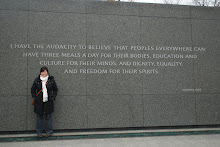Last night at our board meeting, the chair of the Garden board looked directly at me and said, "You're on the road to burn-out, and I'm concerned." He's right, but slightly off - I think I already am burned out. The last two weeks have been really exhausting, and really stressful. Really, really. Good news is, it's over - I just submitted the federal grant application that I've been staying up late and skipping days off work to finish. Was it worth the cost to my body and spirit, though? Was it worth the headaches from staring at a computer screen and re-reading the 136+ page instruction manuals to find the one paragraph that talks about what size margins the budget justification page is supposed to have? (They are seriously that picky). Or skipping house dinner and distancing myself from friends to fill out the reams of online forms? Or feeling too tired to even pray?
The grant we applied for was a Community Food Projects grant to do participatory research on food security in 3 low-income farm worker communities in Oxnard. I'm excited about the project, especially since it brings together 6 different partner organizations we've been working with in the area, including a major farm worker employer and agribusiness, Reiter Bros. The kicker though, is that this research will be led and designed by Community-based Researchers (read: people actually from the community, and even farm workers themselves, rather than outside academics). The local university is also partnering with us to pair student researchers with these community researchers. It's a great opportunity that I think will strengthen community ties so that hunger issues will be addressed from within and through relationship with the poor rather than just pouring in aid from outside. But the process of applying for the money to fund this made me apprehensive, because of how grants are designed.
Grants are predicated on the whole idea of measurable, "evidence-based outcomes." I.e., Success. Basically, the Big Money wants to fund projects that address a problem (some call it a crisis), and whose problems they can fix. And you have to have certain objectives along the way that can be met. For example, "we will address (name %) rates of food insecurity in (name area populated by poor people) by starting 2 farmers' markets in (name time frame)." Which I think promotes the mindset that we can change the world, one dollar at a time, checking off our check-list of solve-able problems. Or, if I'm cynical, this promotes a crisis-seeking mindset within non-profits to fund/promote their existence.
This morning, I was commiserating with Alice, a friend who runs another non-profit, about grants' emphasis on success through "measurable outcomes," and she said, "You have to read a chapter from this book by Greg Boyle!" and off she went to get it. Greg Boyle is a Catholic priest, and the founder of "HomeBoy Industries," an organization in inner-city L.A. to provide jobs, training, and encouragement to young people who are in the gang culture.
So, here I am, sitting in her office and nearly in tears because of Boyle's words. He brings it back to Jesus, just who I've been needing to come back to in this tension. Listen to this:
"Success and failure, ultimately, have little to do with living the gospel. Jesus just stood with the outcasts until they were welcomed or until he was crucified - whichever came first...
"The Left screamed: 'Don't just stand there, do something.' And the Right maintained: 'Don't stand with those folks at all.'
... "How do we get the world to change anyway? Dorothy Day asked critically: 'Where were the saints to try and change the social order? Not just minister to the slaves, but to do away with slavery.' Dorothy Day is a hero of mine, but I disagree with her here. You actually abolish slavery by accompanying the slave. We don't strategize our way out of slavery, we solidarize, if you will, our way toward its demise. We stand in solidarity with the slave, and by so doing, we diminish slavery's ability to stand. By casting our lot with the gang member, we hasten the demise of demonizing. All Jesus asks is, 'Where are you standing?' And after chilling defeat and soul-numbing failure, He asks again, 'Are you still standing there?'
"Can we stay faithful and persistent in our fidelity even when things seem not to succeed?
I suppose Jesus could have chosen a strategy that worked better (evidence-based outcomes) - that didn't end in the Cross - but he couldn't find a strategy more soaked with fidelity than the one he embraced." (Tattoos on the Heart: The Power of Boundless Compassion 172-173)
Oh thank you, de-centering and re-centering Jesus.
Subscribe to:
Post Comments (Atom)




2 comments:
thank you for this kat--they're good words for someone (me) who is trying to figure out what to do with life.
I hope yours is a little more peaceful now, tho'.
-kari
:)
i love your words so much.
oh. and greg. that looks like a book that's getting added to the amazon wishlist.
(2 weeks!)
Post a Comment